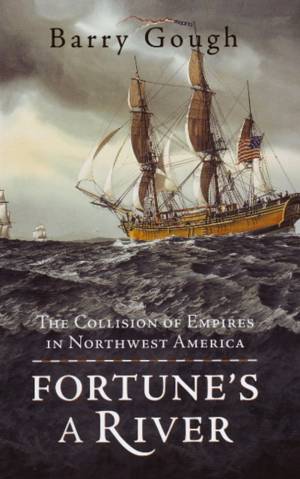
- Retrait gratuit dans votre magasin Club
- 7.000.000 titres dans notre catalogue
- Payer en toute sécurité
- Toujours un magasin près de chez vous
- Retrait gratuit dans votre magasin Club
- 7.000.0000 titres dans notre catalogue
- Payer en toute sécurité
- Toujours un magasin près de chez vous
18,45 €
+ 36 points
Description
Winner of the John Lyman Book Award for best Canadian naval and maritime history
Finalist for the Nereus Writers' Trust Non-fiction Award
Finalist for the Roderick Haig-Brown Regional Prize, BC Book Prize
Longlisted for the 2007 Victoria Butler Book Prize
Honourable Mention for the Canadian Nautical Research Society's Keith Matthews Award
Fortune's a River is the most authoritative and readable account to date of just how British Columbia became British and how Oregon, Washington and Alaska became American. By the closing years of the 18th century, the stage was set for a major international confrontation over the Northwest Coast. Imperial Russia was firmly established in Alaska, Spain was extending its trade routes north from Mexico, Captain James Cook had claimed Northwest America for England and Captain Robert Gray had claimed the Columbia River region for the United States. Open warfare between Spain and England was narrowly averted during the Nootka Sound Controversy of 1789-1794, and again between Britain and the US in the War of 1812, when a British warship seized American property in Oregon.
In Fortune's a River, noted historian Barry Gough re-examines this Imperial struggle for possession of the future British Columbia and fully evokes its peculiar drama. It turned out the great powers were reluctant conquerors in this area. Russia and Spain withdrew of their own accord. Britain was in a position to dominate, but couldn't be bothered. The US vaguely wished to fulfill its manifest destiny by securing the Northwest Coast, but it was not a priority. In the end the battle was carried on by private enterprise and individuals of vision. Alexander Mackenzie established an overland route to the coast and with his partners Simon Fraser and David Thompson, set up a network of fur trading forts south to Oregon. US president Thomas Jefferson countered by sending out the Lewis and Clark expedition to strengthen American claims and an American entrepreneur, John Jacob Astor, established a lonely US outpost at Astoria. Gough examines each of the players in this territorial drama, bringing them fully to life and vividly recounting their hardships and struggles. Fortune's a River is a major historical work that reads like a wild west adventure.
Finalist for the Nereus Writers' Trust Non-fiction Award
Finalist for the Roderick Haig-Brown Regional Prize, BC Book Prize
Longlisted for the 2007 Victoria Butler Book Prize
Honourable Mention for the Canadian Nautical Research Society's Keith Matthews Award
Fortune's a River is the most authoritative and readable account to date of just how British Columbia became British and how Oregon, Washington and Alaska became American. By the closing years of the 18th century, the stage was set for a major international confrontation over the Northwest Coast. Imperial Russia was firmly established in Alaska, Spain was extending its trade routes north from Mexico, Captain James Cook had claimed Northwest America for England and Captain Robert Gray had claimed the Columbia River region for the United States. Open warfare between Spain and England was narrowly averted during the Nootka Sound Controversy of 1789-1794, and again between Britain and the US in the War of 1812, when a British warship seized American property in Oregon.
In Fortune's a River, noted historian Barry Gough re-examines this Imperial struggle for possession of the future British Columbia and fully evokes its peculiar drama. It turned out the great powers were reluctant conquerors in this area. Russia and Spain withdrew of their own accord. Britain was in a position to dominate, but couldn't be bothered. The US vaguely wished to fulfill its manifest destiny by securing the Northwest Coast, but it was not a priority. In the end the battle was carried on by private enterprise and individuals of vision. Alexander Mackenzie established an overland route to the coast and with his partners Simon Fraser and David Thompson, set up a network of fur trading forts south to Oregon. US president Thomas Jefferson countered by sending out the Lewis and Clark expedition to strengthen American claims and an American entrepreneur, John Jacob Astor, established a lonely US outpost at Astoria. Gough examines each of the players in this territorial drama, bringing them fully to life and vividly recounting their hardships and struggles. Fortune's a River is a major historical work that reads like a wild west adventure.
Spécifications
Parties prenantes
- Auteur(s) :
- Editeur:
Contenu
- Nombre de pages :
- 416
- Langue:
- Anglais
Caractéristiques
- EAN:
- 9781550174595
- Date de parution :
- 30-11-08
- Format:
- Livre broché
- Format numérique:
- Trade paperback (VS)
- Dimensions :
- 229 mm x 155 mm
- Poids :
- 1474 g

Les avis
Nous publions uniquement les avis qui respectent les conditions requises. Consultez nos conditions pour les avis.






